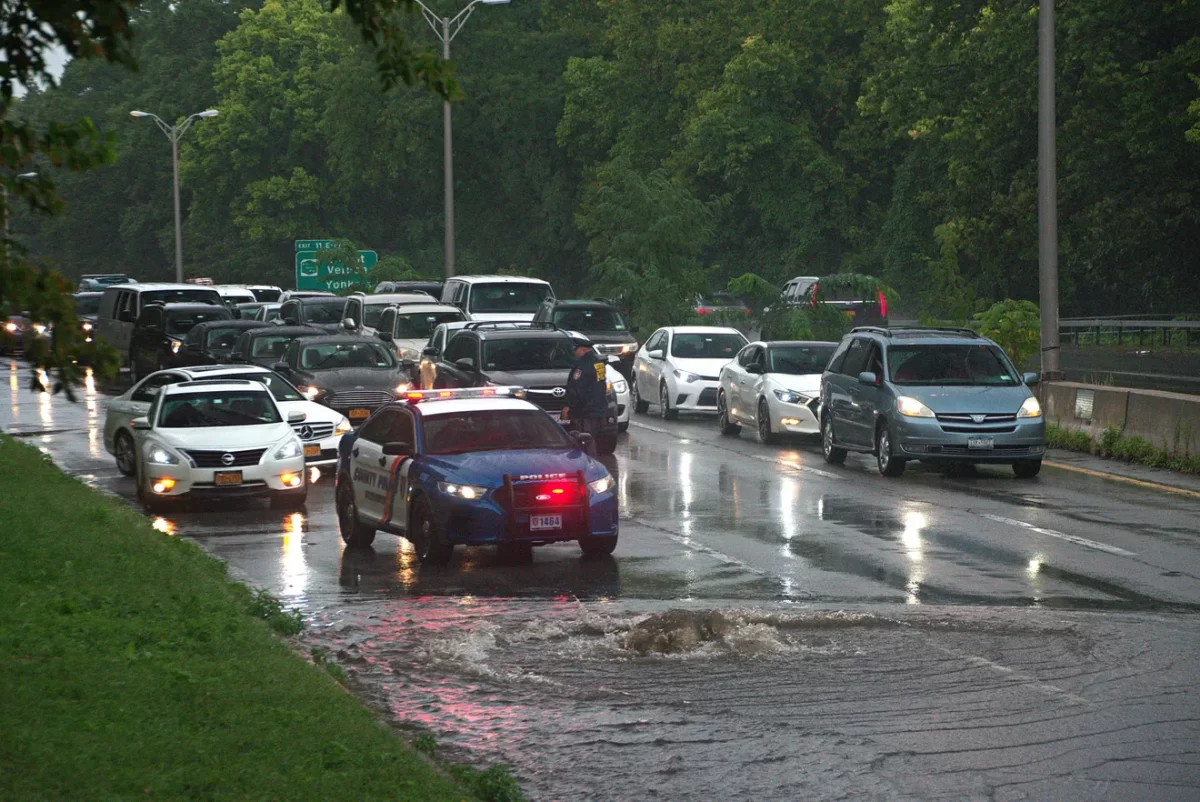On Sept. 29, there was a torrential downpour in Westchester County which resulted in major flooding. Roads were closed, cars were submerged under water, and people were stuck in traffic for hours on end. This storm highlighted issues within the county’s flood management techniques that cannot be ignored.
Residents of Westchester County shouldn’t have to be concerned about losing their cars or their homes whenever it rains. To solve this issue, the implementation of flood barriers along Westchester County roads should be incorporated into the existing flood prevention tactics to lessen the amount of devastation created by large rainstorms. This solution also involves that residents of Westchester County take small individual action to assist in decreasing the severity of flooding and flood damage.
Here at Mercy, different areas that students come from have different conditions for every storm, and it can cause some students to miss classes that are important to their semester. Many Mercy University students use the shuttle system to get to and from the university, and it is an essential part of the journey as a lot of students do not have cars and other ways to get to routes to get to class directly.
There are two shuttle buses that are a direct help and go straight to the school, one that goes to and from the Bronx Campus, and another that goes to Westchester Square. These shuttles are directly impacted when there is flooding, as they need access to get to the highways to take students from and to Mercy from where they pick them up.
There are quite a few differing opinions on this from people who take the shuttle. Genesis, a sophomore student at Mercy, often takes the shuttle to get to a bus that would give her a direct path to her home. She has classes in the Bronx and Dobbs Ferry and says it’s extremely hard to get to Dobbs, where most of her classes and better facilities are. When it is flooding, and they must cancel service. She said she thinks a solution is to “let the shuttles have an alternative route to go local when this happens.”
She also continued by saying “I wish they were more understanding for those with no car.”
Eduardo, a freshman, says he takes the shuttle from Westchester Square to get to Dobbs from every class. He said he had to miss a class last time it flooded because it was early in the morning and no cancellations had happened yet.
He said, “They can make better roads, possibly raise the roads and have them higher above ground so issues like this don’t happen.”
Overall, the many students who take the shuttle have differing opinions on how to fix it, and there are a lot of different solutions, but it is about weighing which one fits the problem the best way.
However, the people who drive the shuttles don’t always think it’s easy, and say they are equipped to drive in any weather. One unnamed driver said they “don’t care what weather it is, they will drive” and there are “alternate routes they don’t want me to take but I know I can make it more efficient.”
He also said that the county has “a lot of work to do on highways” and there are tons of safer routes so it could be good for drivers to “alternate in these cases.”
Adelina, a junior student whose brother works on highways and is well-versed in the highway system, said “It is recommended that the use of temporary flood protection systems should be incorporated throughout the county and along roadways as a preventative action to avoid parkways from becoming flooded and closed down. The ideal temporary flood protection system for Westchester County would be a flood barrier. These barriers consist of metal walls, or frames with water-resistant fabrics fastened onto them. These flood barriers have metal rods that support the walls of the barrier to ensure the walls stay upright against the pressure of the flood water.”
She continued “The walls of the flood barrier can be extended higher if conditions require it allowing for flexibility in regard to protection needed against raising water levels. These flood barriers simply need to be fastened into the ground to ensure stability. Once they have been installed, they are completely equipped to handle flooding conditions and protect roadways and residential areas.”
She then detailed her brother had told her it was very doable to fix the highway system and implement flood barriers, but it would be hard because of taxpayer money, and governments not willing to spend. Overhauling the system would be greatly beneficial to the Mercy Shuttle as there would be no shutdowns when storms come, and it would be much easier to prevent class cancellations.
No matter what, there can be more done to help this shuttle system in the situation of a storm and make Mercy easier to get to for students who need to get to school by only that method. Whether it is the county putting together a more efficient highway system, or the shuttles taking more effective routes, this winter will see challenges and it is interesting to see how they respond.










